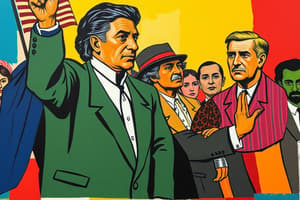Podcast
Questions and Answers
What period is referred to as Salutary Neglect?
What period is referred to as Salutary Neglect?
- 1763-1776
- 1776-1783
- 1607-1763 (correct)
- 1783-1791
What economic system is focused on accumulating wealth through exports?
What economic system is focused on accumulating wealth through exports?
Mercantilism
What did the Sugar Act of 1764 impose tariffs on?
What did the Sugar Act of 1764 impose tariffs on?
Sugar, wine, coffee, and other imported items
Who was George Grenville?
Who was George Grenville?
Who was King George III?
Who was King George III?
What did the Stamp Act of 1765 place taxes on?
What did the Stamp Act of 1765 place taxes on?
What was established by the Stamp Act Congress in 1765?
What was established by the Stamp Act Congress in 1765?
What was the Sons of Liberty known for?
What was the Sons of Liberty known for?
What did the Declaratory Act of 1767 reaffirm?
What did the Declaratory Act of 1767 reaffirm?
What did the Townshend Revenue Act of 1767 tax?
What did the Townshend Revenue Act of 1767 tax?
What was the role of the Board of Customs Commissioners?
What was the role of the Board of Customs Commissioners?
Who was Samuel Adams?
Who was Samuel Adams?
What event is referred to as the Boston Massacre?
What event is referred to as the Boston Massacre?
What did the Tea Act of 1773 allow the East India Tea Company to do?
What did the Tea Act of 1773 allow the East India Tea Company to do?
What was the Boston Tea Party?
What was the Boston Tea Party?
What were the Coercive Acts also known as?
What were the Coercive Acts also known as?
What did the Quebec Act of 1774 do?
What did the Quebec Act of 1774 do?
What did John Locke argue in his Two Treatises of Government?
What did John Locke argue in his Two Treatises of Government?
What was the main argument of Thomas Paine's Common Sense?
What was the main argument of Thomas Paine's Common Sense?
What was the purpose of the 1st Continental Congress?
What was the purpose of the 1st Continental Congress?
What did the Albany Plan of Union propose?
What did the Albany Plan of Union propose?
What did the Declaration of Rights and Resolves state?
What did the Declaration of Rights and Resolves state?
Who were the participants of the 2nd Continental Congress?
Who were the participants of the 2nd Continental Congress?
What was the Olive Branch Petition?
What was the Olive Branch Petition?
What did the Declaration of the Causes and Necessity of Taking up Arms express?
What did the Declaration of the Causes and Necessity of Taking up Arms express?
Who were the Loyalists?
Who were the Loyalists?
What did the Prohibitory Act of 1776 do?
What did the Prohibitory Act of 1776 do?
Who were the Hessians?
Who were the Hessians?
What were Minute Men?
What were Minute Men?
What was the Peace of Paris of 1783?
What was the Peace of Paris of 1783?
Flashcards are hidden until you start studying
Study Notes
Colonial Relations and Governance
- Salutary Neglect occurred from 1607 to 1763, allowing American colonies to operate with independence due to relaxed enforcement of Parliamentary laws.
- Mercantilism prioritized the accumulation of wealth through limited imports and maximized exports, focusing on precious metals as a primary resource.
- The Sugar Act of 1764 imposed tariffs on imports like sugar and coffee, leading to colonial resistance.
- George Grenville succeeded Prime Minister William Pitt and was instrumental in enforcing various legislative acts affecting colonial governance.
- King George III's indifference to colonial grievances marked a pivotal point in escalating tensions between Britain and the colonies.
Taxation and Colonial Response
- The Stamp Act of 1765 levied taxes on printed materials, provoking widespread anger among colonists.
- The Stamp Act Congress of 1765 represented a collective colonial response, petitioning for the repeal of the Stamp Act.
- Sons of Liberty emerged as a radical group opposing British authority, known for violent protests and vandalism against tax collectors.
- The Declaratory Act of 1767 affirmed Parliament's ability to enact laws binding the colonies, reinforcing British control.
- Townshend Revenue Act of 1767 introduced indirect taxes on various imports, igniting further protests among colonists.
Events Leading to Revolution
- The Boston Massacre of 1770 escalated tensions, resulting in the death of five colonists when British soldiers fired into a hostile crowd.
- The Tea Act of 1773 allowed the East India Tea Company to sell directly to Americans, provoking boycotts due to perceived favoritism.
- The Boston Tea Party involved the Sons of Liberty dumping tea into Boston Harbor as a protest against the Tea Act.
- Coercive Acts of 1774 (Intolerable Acts) aimed to punish Massachusetts, closing Boston Harbor and limiting self-governance.
- The Quebec Act of 1774 expanded Canadian territory, inciting fears of a growing British influence over colonial land claims.
Enlightenment Influence and Revolutionary Ideas
- John Locke's "Two Treatises of Government" argued for the social contract and the right to overthrow ineffective governments, influencing revolutionary thought.
- Thomas Paine's pamphlet "Common Sense" criticized the monarchy, rallying support for independence and republican governance.
Continental Congresses and Independence
- The First Continental Congress convened delegates from twelve colonies to formulate a response to British actions, featuring leaders like John Adams and George Washington.
- The Albany Plan of Union proposed a cooperative government structure, though it would remain subordinate to Parliament.
- The Declaration of Rights and Resolves asserted colonial rights to self-legislation in taxation matters, limiting Parliament’s power.
- The Second Continental Congress included influential figures, shaping the ongoing revolutionary efforts.
- The Olive Branch Petition expressed loyalty to King George III, seeking reconciliation, but was ignored.
War and Aftermath
- The Declaration of the Causes and Necessity of Taking up Arms indicated a willingness among colonists to fight for their rights.
- Loyalists represented a significant faction of the population, opposing revolutionary sentiments and fearing loss of status and property.
- The Prohibitory Act of 1776 classified resistance to Britain as treason and enacted a blockade of colonial ports.
- Hessians were German mercenaries hired by King George III, but their brutal tactics alienated colonial support for the king.
- Minute Men were local militia prepared to respond quickly to British actions, embodying the spirit of resistance.
- The Peace of Paris in 1783 officially ended the Revolutionary War, acknowledging American independence while concluding prolonged conflict with Britain.
Studying That Suits You
Use AI to generate personalized quizzes and flashcards to suit your learning preferences.




